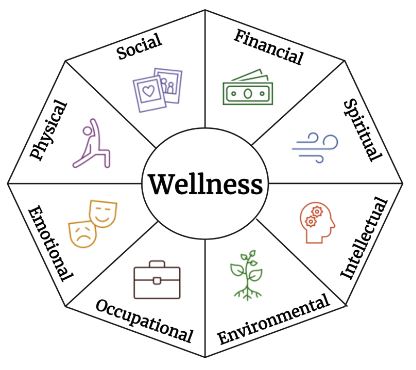Goal. The goal of this document is to support personal wellness in a collaborative scientific community, leading to effective practices that will propagate to all aspects of community members’ working environments. It was developed in spring 2022 by members of the NSF Center for Sustainable Nanotechnology (CSN), and this version was adapted for sharing outside of the CSN. The recommendations outlined in this document are intended to provide a framework on incorporating wellness into one’s everyday life, as well as recognizing and rejecting grind culture in the academy. We believe that success in STEM can be achieved without sacrificing individual well-being and that normalizing a culture of wellness for members of our collaborative group will ultimately have an impact on the broader academic community.
Wellness is a broad term that looks different for everyone, but one definition is that “wellness is the act of practicing healthy habits on a daily basis to attain better physical and mental health outcomes.” (Pfizer) We believe that the act of practicing wellness will lead to our community members becoming complete scientists – feeling free to bring our whole selves to our work. Wellness is often framed as having eight dimensions, as shown to the right.
Common obstacles that academic scientists encounter when pursuing holistic wellness include narrow definitions of success, the ideal worker myth, and grind culture at large. Grind culture is a culture where raw achievement is prioritized, and longer and longer hours are assumed to contribute to better work outcomes. Grind culture can lead to academic burnout, imposter syndrome, and cognitive dissonance between maintaining personal wellness and work success.

Concrete things you can do to promote wellness
- Commit to ending meetings on time or early
- Offer flexibility on internal deadlines
- Use funding to support extended graduation timelines
- Provide agendas for meetings in advance
- Ask for preferences and accommodations needed around group gatherings
- Make meeting recordings and notes available for those who aren’t able to attend
- Offer a distributed mentoring network for students & postdocs (and faculty)
- Explicitly address wellness in evaluations
- Provide professional development and outreach opportunities to explore a variety of passions and career paths
- Be open to new ideas for promoting wellness
Suggestions for what to do next
- Use the 8 dimensions of wellness to think about your own wellness, and also about where in the 8 dimensions you have influence over others’ wellness.
- After you have identified areas where you want to improve your wellness, brainstorm what people or resources can help you: e.g. mentors, advisors, campus or community resources, etc.
- Bring wellness principles into the meetings and spaces where you have influence while recognizing that others may be focused on different wellness dimensions than you are.
- It may be very difficult to focus equally on all eight dimensions at once! Consider how you can maintain a balance among the dimensions for your overall wellness. You may need to prioritize some areas more than others, but sacrificing any area too much for the sake of another will undermine your overall wellness. Different people will have different calibration for this balance, and it will change at different stages of life.
Examples of recommended wellness practices for collaborative STEM spaces
Notes: These are just a few examples, not meant to be an exhaustive list; some items may overlap between dimensions
Physical wellness:
- If you are scheduling a meeting, make sure there are breaks built in, and don’t run long.
- Organize events that promote physical health such as outdoor social opportunities, group meditation, or professional development opportunities. (Make sure group activities are inclusive.)
- If you are sick, stay home, both so you can get better and to preserve others’ health.
- If you are organizing an event with food, provide nutritious options as well as considering other dietary needs (e.g. vegetarian, gluten free).
Emotional/mental wellness:
- Make a habit of “check ins” at the beginning of meetings so people can share (if they want).
- Identify quiet spaces on campus for meditation, solitude, or contemplation.
- Make sure group members are aware of local resources such as therapy or counseling options offered by the university.
- Promote the idea that you’re not only supposed to stay home when sick but also when needing time off for mental wellness.
Financial wellness:
- For faculty/admin: when possible, find ways that students and postdocs do not have to “float” money out of pocket to access events and resources.
- Pay undergraduate researchers for lab work so that they can afford to gain needed technical experience.
- Note: it is important to find a balance between reinforcing capitalism and acknowledging that lack of financial stability can cause stress and anxiety. Other financial wellness examples that don’t focus on making money include supporting charitable contributions or sharing information about mutual aid in your community.
- Identify what your comfort zone is with regards to future money making/careers, noting that these priorities as well as financial responsibilities will be different for everyone.
Environmental wellness:
- When organizing events, work to facilitate recycling and reduce pollution. Support local businesses that have strong sustainability practices such as recycling and composting.
- Provide air filters and high quality masks so that researchers can mitigate COVID concerns while working.
- Encourage everyone to consult on-campus occupational health offices so that desks, chairs, standing mats, etc promote ergonomics.
- Organize professional development about recycling policies and practices.
- Think about ways to bring the natural world into your work space (especially in offices with no windows), such as plants, fish, and/or daylight lamps.
Intellectual wellness:
- Participate in activities that cultivate mental growth in your areas of interest.
- Allow yourself to try to engage deeply with intellectual content that is far from your area of expertise.
- Participate in creative activities and outside academic interests to engage your “multiple intelligences.”
Social wellness:
- Promote social activities with colleagues and lab members at a variety of times (to accommodate different schedules).
- Learn good communication skills that are assertive rather than passive or aggressive.
- Be genuine, authentic, and respectful toward others.
- When organizing events, support local businesses with strong community ties and/or supporting social justice efforts.
- Nurture social connections including friends and family outside of work.
Occupational wellness:
- Identify a work schedule that works for your own wellness. This may not conform to traditional hours or meet an artificial “hour per week quota” as long as it still advances your long-term occupational goals.
- Discuss work expectations within your group and be open to different perspectives and needs – students/postdocs and PIs need to communicate clearly with each other about what works for you and why, and be ready to adapt.
- Be transparent and explicit in communicating about other group processes, e.g. conference attendance, requirements for graduation, meetings, milestones, vacation time, etc.
- Practice verbal appreciation of contributions, both from PI to students/postdocs and vice versa.
Spiritual wellness:
- Identify quiet spaces on campus for meditation, solitude, or contemplation.
- Build cultural competency about various spiritual traditions.
- Include and/or accommodate religious/spiritual observance when planning events.
- Allow space for yourself and others to engage in religious/spiritual practice.
A few additional references
- Peggy Swarbrick. A Wellness Approach. Psychiatric Rehabilitation Journal, 2006, 24(4): 311-314. https://doi.org/10.2975/29.2006.311.314
- Swarbrick & Yudof. Wellness in 8 Dimensions. © 2017 CSPNJ, Freehold, NJ.
- Creating a Healthier Life: A Step-by-Step Guide to Wellness. Substance Abuse and Mental Health Services Administration (SAMSA). samhsa.gov
- Collaborative Support Programs of New Jersey (CSPNJ) Wellness Resources: cspnj.org/wellness-resource/
- The Eight Dimensions of Wellness. William & Mary Health & Wellness Office.
- Mental health in academia: Hacks for cultivating and sustaining well being
- An examination of college student wellness: A research and liberal arts perspective
- The Impact of Research Culture on Mental Health & Diversity in STEM
- The Eight Dimensions of Wellness – SAMSA (YouTube Link)
- The Psychology of Radical Healing: What can psychology tell us about healing from racial and ethnic trauma? Helen A. Neville, Hector Y. Adames, Nayeli Y. Chavez-Dueñas, Grace A. Chen, Bryana H. French, Jioni A. Lewis, & Della V. Mosley (2019), The Psychology of Radical Healing Collective.
- Stoewen, D. Dimensions of wellness: change your habits, change your life. Canadian Veterinary Journal, 2017, 58(8): 861-862
- Roddick, Marjie. The 8 Dimensions of Wellness: Where Do You Fit In? Good Therapy blog May 27, 2016.
